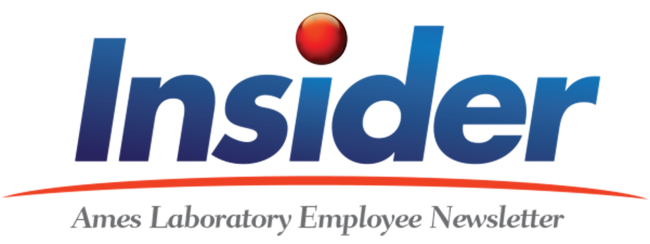
In this issue:
New Policy Addresses Work from Home Ergonomics
New partnership aims to toughen samarium cobalt magnets
Job Opportunities at Ames Laboratory
2021 Performance Appraisals to begin
Scientists look to meteorites for inspiration to achieve critical element-free permanent magnet
Debunking misinformation about the COVID-19 vaccine
United Way, Ames Lab cookbook campaigns a big success
Uninterruptible Power Supply inventory underway
Record breaking hat & mitten donations
It’s that (icy) time of year. Get some traction action!
Looking Back: Employees share their New Year's resolutions
New Policy Addresses Work from Home Ergonomics
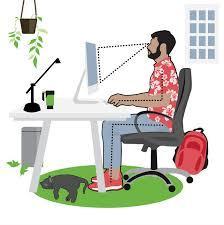 There’s certainly good news on the COVID front with the vaccine roll-out. It will be some time, however, before full distribution begins to have a positive impact. It is likely that Ames Lab will remain in a maximum telework policy for several months. Extended periods of telework with less than ideal office equipment can create aches and pains you’ve never had before. To help staff work safely the Laboratory has developed a policy to address potential ergonomic problems.
There’s certainly good news on the COVID front with the vaccine roll-out. It will be some time, however, before full distribution begins to have a positive impact. It is likely that Ames Lab will remain in a maximum telework policy for several months. Extended periods of telework with less than ideal office equipment can create aches and pains you’ve never had before. To help staff work safely the Laboratory has developed a policy to address potential ergonomic problems.
If you have been working from home, and think you may be experiencing work-related ergonomic issues, we want to hear from you so your discomfort can be addressed. The Laboratory will conduct a virtual ergo assessment, and may provide, at no cost to staff, certain types of ergonomic equipment to be used at home. It all starts with emailing safety@ameslab.gov, with “Home Ergo Issue” in the subject line. ESH will be in contact with you to get the ball rolling on improving your telework experience.
New Employees join Ames Lab
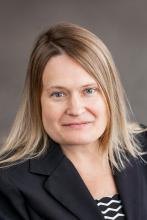 As Deputy Director of Finance for Budget, Emily Ladewig is responsible for development and management of the Laboratory’s budget. That includes supporting the Laboratory’s short- and long-range financial planning and managing funding requests to federal agencies, as well as forecasting, analyzing and monitoring budgets and accounts.
As Deputy Director of Finance for Budget, Emily Ladewig is responsible for development and management of the Laboratory’s budget. That includes supporting the Laboratory’s short- and long-range financial planning and managing funding requests to federal agencies, as well as forecasting, analyzing and monitoring budgets and accounts.
This is Ladewig’s second stint at Ames Lab. She was previously an Assistant Chief Accountant in 2015. She comes back to the Lab after serving as Director of Finance for VenuWorks, the firm which managed the Iowa State Center and also served there as Interim Front of House Manager.
A native Iowan, Ladewig spent most of her early years in Clinton and Marshalltown. She holds a Bachelor of Business Administration /Accounting from the University of Iowa and a Master’s of Business Administration from Colorado State University.
She is married and the couple has one daughter who attends Ames Middle School. They are also the proud parents of a French bulldog. The family lives in north Ames near the Ada Hayden Heritage Park and enjoys daily walks around the lake.
In her spare time, Ladewig enjoys family and travel which “takes me to Colorado, Florida and Chicago often. This fall I road tripped with my brother taking my nephew to college. Joining them in Ft. Collins, CO we headed west to Portland, OR and then came back through Seattle, WA. While on the trip I knocked another bucket list item off, visiting all things Goonies in Astoria, OR. I've yet to make it to my cousins in Norway, but it is on the list. “
 Karl Duke is the new Director of Procurement at Ames Lab and will lead the Lab's procurement operations in support of the Lab's mission.
Karl Duke is the new Director of Procurement at Ames Lab and will lead the Lab's procurement operations in support of the Lab's mission.
Duke grew up in North Mississippi but has spent most of his adult life living in Chicago. He has a B.A. in Interdisciplinary Studies from the University of South Carolina, attended the University of Mississippi, Oxford, MS, for business related studies, attended Webster University, St. Louis, MO, for master’s degree program in Management Information Systems and has taken courses at George Mason University School of Public Policy for contract management and project management related studies for a master’s Certification in Commercial Contracting.
He served active duty in the US Air Force as a Contracting Specialist at Shaw AFB, SC and worked in supply chain management for the U.S. Postal Service. He come to Ames Lab after serving as Procurement Specialist IV at Fermi Lab at Batavia, IL.
Duke currently lives in Chicago with his English bulldog, Vern, but will be closing on a new home in Ames around mid Jan 2021. In his spare time, he enjoys gardening, traveling, nature hikes, dog parks and biking. He also enjoys the arts and culture scene and attending music venues -- “I played trumpet in a jazz band back in my early days in Chicago for fun.” He also considers himself an amateur foodie guy, a sci-fi buff, and a lover of craft beers and wines.
 Seungjin Nam is a Postdoctoral Research Associate with Ames Lab scientist Ryan Ott. He will be involved in research related to development and characterization of magnetic and structural materials and focused on the combinatorial study for Al-Ce alloys via additive manufacturing method.
Seungjin Nam is a Postdoctoral Research Associate with Ames Lab scientist Ryan Ott. He will be involved in research related to development and characterization of magnetic and structural materials and focused on the combinatorial study for Al-Ce alloys via additive manufacturing method.
Nam was born and raised in Seoul, Korea “a small but very vibrant and exciting city.” He holds a B.S. from the School of Advanced Materials Engineering, Kookmin University, Seoul, Republic of Korea. He also received his Ph.D there in the Department of Materials Science and Engineering and did his dissertation on the Study on Relation between Microstructure and Mechanical behavior in AlCoCrFeNi-based High-entropy Alloys
Nam is married and he and his wife have a 10-month-old daughter. “I really miss my wife and baby who are staying in Korea. In case they come here later, I found a quiet apartment in the South Ames near ISU Research Park.”
In his spare time, he “tries to cook good and fresh food” and avoid heavy foods like burgers or pizza. He also likes to take walks with a camera through the nearby parks.
New partnership aims to toughen samarium cobalt magnets
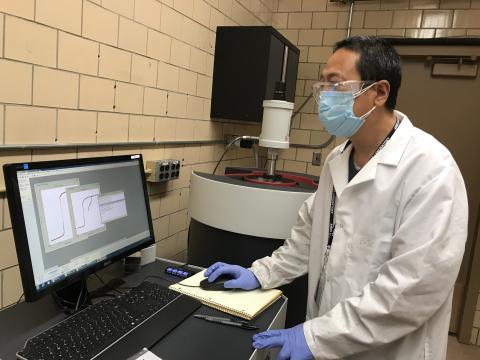
Ames Laboratory will partner with Electron Energy Corporation to improve a mainstay of magnet technology-- the samarium cobalt (SmCo) magnet.
Since their development in the 1960s, SmCo magnets have been a workhorse in modern technology, second only in strength to neodymium magnets. They are extremely resistant to demagnetization, and able to withstand high heat and corrosion.
That high magnetic power density and excellent temperature stability has made SmCo magnets the first choice for many uses, including military, spacecraft, aerospace, and marine applications.
READ MORE
Job Opportunities at Ames Laboratory
Did you know you can find a current list of employment opportunities at Ames Laboratory on the Job Opportunities page at www.ameslab.gov? Share with friends and colleagues, or apply yourself! You can also find the page linked on the Employee Dashboard.
2021 Performance Appraisals to begin
Ames Laboratory’s 2021 performance appraisal process will begin on Tuesday, January 19, 2021 and end Friday, February 26, 2021. All tasks in the process for professional and scientific (P&S) employees and postdocs will be completed within Halogen eAppraisal (also referred to as Saba after Halogen was acquired). Automated emails from Halogen will be sent to you when you have a task to complete. The review period for the appraisal covers 1/1/2020 – 12/31/2020. There is a Halogen/Saba app in Okta. If you are off-site, you will also need to VPN into Ames Lab’s network prior to accessing Halogen. Information about connecting to Ames Laboratory’s VPN can be found here.
The year 2020 brought many changes and surprises. It is vital for supervisors and employees to reflect on the unprecedented time and adjustments that needed to be made. In some cases, goals may need to be altered to account for maximum telework and other priorities.
Should you have any questions or need one-on-one assistance or training to help you through this process, please contact Ames Laboratory Human Resources Office at hrappraisal@ameslab.gov. Should you have any issues accessing Halogen, please contact the Ames Laboratory Information Technology office at (515) 294-8348 or IT@ameslab.gov.
Scientists look to meteorites for inspiration to achieve critical element-free permanent magnet
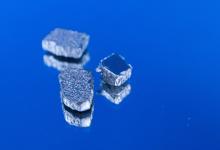 The U.S. Department of Energy’s (DOE’s) Critical Materials Institute has developed a low-cost, high performance permanent magnet by drawing inspiration from an out-of-this-world source: iron-nickel alloys in meteorites. The magnet rivals widely used “Alnico” magnets in magnetic strength and has the potential to fill a strong demand for rare-earth- and cobalt-free magnets in the market.
The U.S. Department of Energy’s (DOE’s) Critical Materials Institute has developed a low-cost, high performance permanent magnet by drawing inspiration from an out-of-this-world source: iron-nickel alloys in meteorites. The magnet rivals widely used “Alnico” magnets in magnetic strength and has the potential to fill a strong demand for rare-earth- and cobalt-free magnets in the market.
Here on earth, the strongest permanent magnets are ones containing the rare earth element neodymium – NdFeB magnets. Next strongest are Samarium-Cobalt, or SmCo magnets. Before rare-earth magnets were developed in the 1970s, the strongest magnets were made of aluminum-nickel-cobalt, or Alnico, which are still in wide use today in applications ranging from electric motors to consumer electronics.
The problem with these strong but earthly man-made permanent magnets is that they contain critical elements-- rare earths in the case of NdFeB and SmCo, and cobalt in the case of SmCo and Alnico-- ones that are in high demand for many technologies and for which manufacturers pay a premium for a sometimes unreliable supply. READ MORE
Debunking misinformation about the COVID-19 vaccine
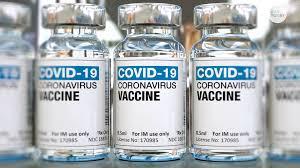
Because of the severity and length of the COVID-19 pandemic and the global roll-out of the vaccine, there is a lot of information circulating in the news and around the internet about the safety, effectiveness, and science behind the vaccine. Unfortunately, there is also a lot of misinformation out there as well, and that can hinder people from making informed medical decisions. While we wait for the vaccine to become more widely available, Ames Laboratory Occupational Medicine would like to tackle some of the more widely shared pieces of misinformation, and set the record straight.
Myth: COVID-19 vaccines are not safe because they were developed and tested quickly.
Fact: Many pharmaceutical companies have invested significant resources into developing COVID-19 vaccines quickly because of the worldwide effects of the pandemic. This emergency situation warranted an emergency response. That does not mean the companies bypassed safety protocols or performed inadequate testing. Severe acute respiratory syndrome (SARS) and Middle East respiratory syndrome (MERS) are two diseases caused by coronaviruses that are closely related to the virus that causes COVID-19. Researchers began working on developing vaccines for these diseases after they were discovered in 2003 and 2012, respectively. Lessons learned from this earlier vaccine research have been used to inform strategies for developing a COVID-19 vaccine.
Myth: I already had COVID-19 and I have recovered, so I don't need to get vaccinated for COVID-19.
Fact: There is not enough information currently available to say if or for how long after infection someone is protected from getting COVID-19 again. This is called natural immunity. Early evidence suggests natural immunity from COVID-19 may not last long, but more studies are needed to better understand this. Occupational Medicine recommends getting the COVID-19 vaccine even if you’ve had COVID-19 previously. However, anyone currently infected with COVID-19 should wait to get vaccinated until one month after their diagnosis.
Myth: I won't need to wear a mask after I get vaccinated for COVID-19.
Fact: It may take time for everyone who wants a COVID-19 vaccination to get one. Until more people are vaccinated, and more is understood about how well the vaccine works, continuing with precautions such as wearing a mask, practicing physical distancing and washing hands frequently, will be important.
Myth: More people will die as a result of a negative side effect to the COVID-19 vaccine than would die from the virus.
Fact: A claim circulating on social media is that the COVID-19 mortality rate is 1%–2% and that people should not be vaccinated against a virus with a high survival rate. However, a 1% mortality rate is 10 times more lethal than the seasonal flu. In addition, the mortality rate can vary widely based on age, sex and underlying health conditions.
While some people who receive the vaccine may develop symptoms as their immune system responds, this is common when receiving any vaccine, and these symptoms are not considered serious or life-threatening. You cannot become infected with COVID-19 from COVID-19 vaccines. These are inactivated vaccines, not live-virus vaccines.
It's important to recognize that getting vaccinated for COVID-19 is not just about survival from COVID-19. It's about preventing spread of the virus to others and preventing infection that can lead to long-term negative health effects. While no vaccine is 100% effective, getting vaccinated is far better than not getting vaccinated. The benefits outweigh the risks in healthy people.
You can find more information regarding myths and facts about COVID-19 vaccinations from Mayo Clinic here, and from the U.S. Centers for Disease Control, here.
United Way, Ames Lab cookbook campaigns were a big success
The year 2020 brought many changes, including the cancellation of the charity auction and United Way event. However, our employees showed up in big ways to make a difference with their generosity. The United Way Campaign and Cookbook sale were huge successes.
Ames Lab’s goal was to raise $10,000 for United Way-- ultimately, Ames Lab employees raised $25,373 (254% of the goal!) Iowa State as a whole exceeded their United Way goal by $61,000+. The United Way Cookbook sold over 80 copies. Melinda Thach was the mastermind and editor behind the cookbook, and she deserves special thanks for her effort. Enjoy trying out some new recipes in the weeks ahead!
Uninterruptible Power Supply inventory underway
Facilities and Engineering Services is working to inventory and log information on all known uninterruptible power supply (UPS) systems throughout the lab. In effort to do this we ask for your help in providing information on all existing UPSs from your lab, workspace or research group.
Having this information will aid us in tracking updates to the equipment, consolidating service agreements and to better manage and plan for utilities usage and upgrades in the future.
Below is a link to a spreadsheet in which you can enter this information.
https://docs.google.com/
Please provide submissions by Friday, January 22.
We ask that you are prompt with your submission of information so we can accurately compile, and begin to develop statements of work for possible consolidated maintenance service agreements. For questions, contact Mitchell Amundson, 294-3614.
Record breaking hat & mitten donations
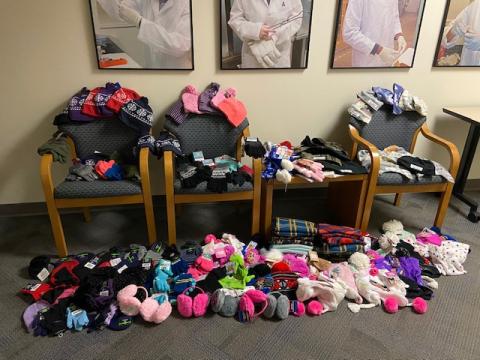 In advance of the holidays, Ames Laboratory decided to continue with hat and mitten donations in 2020, because there is an ongoing need in the community.
In advance of the holidays, Ames Laboratory decided to continue with hat and mitten donations in 2020, because there is an ongoing need in the community.
In addition to the enormous success of the United Way Campaign and Cookbook sale, Ames Lab also broke records in collections of winter wear. There were over 158 items donated, and many of those included sets that contained hats and mittens.
The items are being distributed by the First United Methodist Church, who have organized a winter clothing drive for the community. The donations were very much appreciated, and while fulfilling needs, also provided some excitement about receiving new items.
It’s that (icy) time of year. Get some traction action!
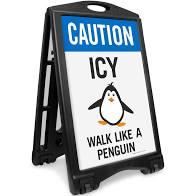 Staff are reminded that, at work or at home, "Get Some Traction Action!" Follow these tips to prevent slips and falls:
Staff are reminded that, at work or at home, "Get Some Traction Action!" Follow these tips to prevent slips and falls:
- Plan Ahead
- Wear Good Boots/Shoes
- Enter/Exit Carefully
- Keep to the Cleared Path
- Do the Penguin Shuffle
https://www.ehs.iastate.edu/weather/winter/walking
Looking Back: Employees share their New Year's resolutions
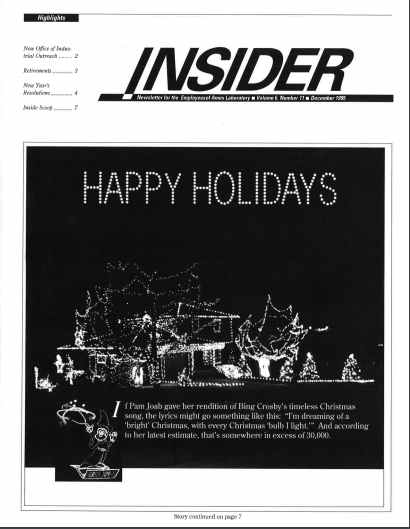 The December 1995 issue of Insider featured New Year's resolutions from a number of staff that ranged from serious to tongue-in-cheek. The issue also had a feature story on the new Office of Industrial Outreach headed by Bob Harris.
The December 1995 issue of Insider featured New Year's resolutions from a number of staff that ranged from serious to tongue-in-cheek. The issue also had a feature story on the new Office of Industrial Outreach headed by Bob Harris.
The issue also had articles on the holiday light display by staff member Pam Joab and the Lab's own Santa Claus, Les Merrit. There were also personal profiles of Lewis Oswood and Willie Wierson.
To read the entire issue, click on the cover.
